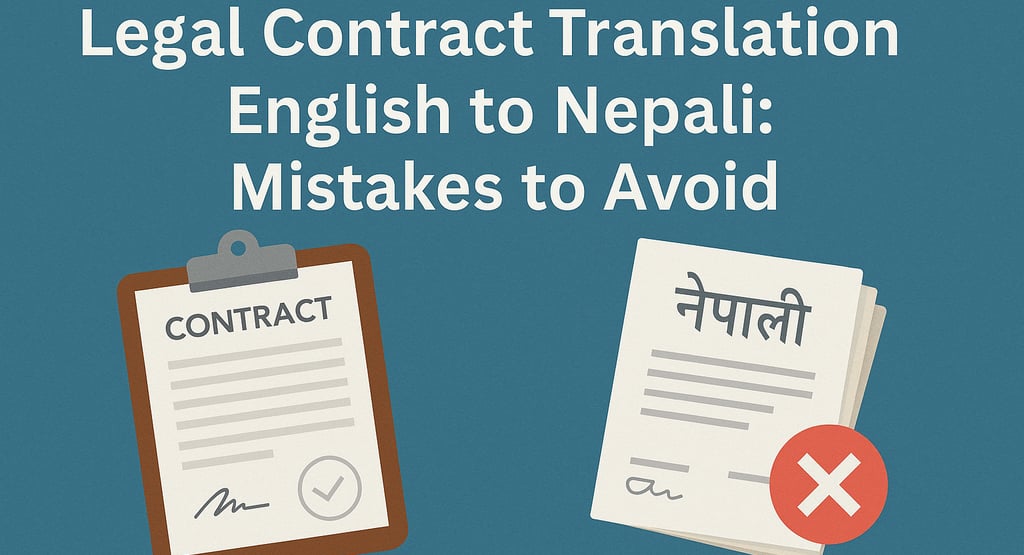Legal Contract Translation English to Nepali: Mistakes to Avoid
Legal contract translation requires precision. Discover common mistakes in English to Nepali legal translation and how professional translators help avoid costly errors.


Introduction
When it comes to legal contracts, every word matters. A single mistranslation in an English to Nepali contract can create disputes, financial losses, or even legal penalties. Unlike general translation, legal translation requires deep subject knowledge, accuracy, and cultural awareness.
In this blog, we’ll look at the most common mistakes people make in legal contract translation and how to avoid them.
Why Legal Translation Is Different
Contracts are legally binding documents. Translating them involves:
Understanding legal terminology in both English and Nepali
Preserving the original meaning word-for-word
Following formatting and structural accuracy
Ensuring consistency in repeated terms
Unlike casual texts, even minor errors can result in serious consequences.
Common Mistakes in Legal Contract Translation
1. Literal Word-for-Word Translation
Legal concepts in English don’t always have direct Nepali equivalents. A literal translation may sound correct but change the meaning of a clause.
2. Ignoring Terminology Consistency
If the term “party of the first part” is translated differently in multiple places, it can cause confusion. Consistency is key.
3. Overlooking Formatting
Sections, numbering, and headings must match exactly between English and Nepali versions. Courts reject poorly formatted translations.
4. Using Non-Professional Translators
Hiring bilingual individuals without legal training can lead to mistranslations. Legal translation requires expertise, not just language skills.
How Professional Translators Prevent Errors
As a certified English ↔ Nepali legal translator, I:
✅ Use approved glossaries for legal terminology
✅ Ensure strict consistency in repeated terms
✅ Keep client confidentiality at the highest level
✅ Provide a signed certification if required by courts or embassies
Real-World Risks of Poor Legal Translation
A mistranslated payment clause may cause financial disputes.
An unclear termination clause may allow a partner to exit without consequences.
Incorrect translation of jurisdiction terms can render contracts unenforceable.
These risks show why professional translation is essential.
FAQs
Q1: Can I use Google Translate for contracts?
No. Machine translation cannot handle legal terminology and formatting requirements.
Q2: Do courts accept translated contracts?
Yes, but only if they are accurate and certified when required.
Q3: How much does a legal contract translation cost?
Usually $0.08–$0.12 per word, depending on complexity.
Q4: How long does it take?
Short contracts can be done within 2–3 days. Larger documents take longer.
Conclusion
Legal contracts are too important to risk with poor translations. Accuracy, consistency, and professionalism ensure both parties clearly understand the agreement.
👉 Need a reliable English to Nepali legal contract translation? Contact me today to safeguard your business with accurate, professional translations.